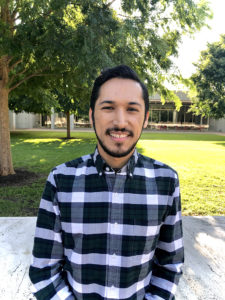Public health student graduates with high honors, high hopes for the future
 Missing graduation during COVID-19 is especially bittersweet for students like Julian Rangel, who have worked hard to get to this moment but understand well the reasons why online commencement ceremonies are one of the safest options right now.
Missing graduation during COVID-19 is especially bittersweet for students like Julian Rangel, who have worked hard to get to this moment but understand well the reasons why online commencement ceremonies are one of the safest options right now.
Rangel graduates this month with an MPH in Public Health Practice.
He and his HSC cohort group have grown close in the last two years, working together on academics, research, Public Health Minority Association (PHMA) initiatives and projects aimed at building a healthier North Texas community.
Rangel was recently awarded the HSC School of Public Health Leon Brachman Community Service Award as this year’s graduating public health student best exemplifying the ideals of academic excellence, leadership and community service. He has also been named into the Delta Omega national public health honor society.
He’s done a lot during his graduate program.
In addition to serving as an officer for PHMA and as a member of the SPH Equity, Diversity and Inclusion committee, Rangel has assisted One Safe Place (OSP) and HSC’s TESSA (Technology Enhanced Screening and Supportive Assistance) Program in providing services to North Texas victims of domestic and interpersonal violence.
During his graduate internship, he focused on interpersonal violence within the LGBTQ+ community, leading to new projects and programs for the Tarrant County Council on Family Violence (TCCFV).
“There’s a notion that interpersonal violence doesn’t happen much in the LGBTQ+ community, but it does,” Rangel said. “The prevalence rate is just as high, if not higher, than for cisgender, heterosexual women. For some people on the LGBTQ+ spectrum, it can range all the way up to 60%.”
Rangel developed a TCCFV resource guide on LGBTQ+ services for legal and advocacy support, faith-based community referrals, shelters, help groups, churches, psychological resources, HIV testing services and other assistance programs.
He also helped OSP staff look inward to develop ways for enhanced outreach to this community. With the Resource Center out of Dallas, he developed a cultural humility-training program, fostering better understanding of LGBTQ+ terms, how to speak the language of this population, and how IPV affects this population. Follow-up surveys helped measure the training’s effectiveness. Action committee initiatives followed, to develop ways of demonstrating that OSP is a place for all of the community, Rangel said.
Within the last year, he has also been named to the Tarrant County Ending the HIV Epidemic Task Force, a CDC initiative rolled out by the Public Health Department, to reduce HIV transmission and infection.
“For a long time, our nation was very aware of HIV and focused on prevention,” Rangel said, “but HIV/AIDS has not been as prominent an issue in recent years. The task force is highlighting that this is still an important public health concern and is working to develop a comprehensive community plan covering four key areas: prevent, respond, diagnose and treat the virus.”
Rangel considers himself as being “pretty lucky” during the COVID-19 pandemic because he has a very supportive family living nearby, plus others to lean on in his academic, professional and personal networks.
He’s planning to stay in the Fort Worth area after graduation, continuing with some of the community service agencies he’s been involved with, as he looks for the ideal public health career opportunity.
“One silver lining in this pandemic, if there is one, is that there’s a lot of hope right now for public health,” Rangel said. “While many of us are missing the simple things we usually enjoy because of social distancing, plus being unable to celebrate graduation together, we also take seriously the jobs we have ahead of us to make a difference in the world through public health.”






Social media